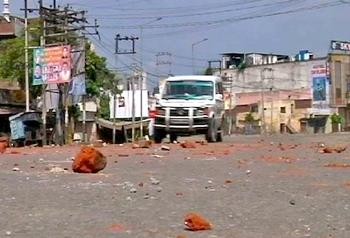Saharanpur, Jul 28: With the situation improving in violence-hit Saharanpur, the district authorities today relaxed curfew for four hours in the new city area to allow people to buy their daily need items from markets which were directed to remain open.
 As the situation has shown improvement, curfew was being relaxed from 10 AM to 2 PM in the new city and from 3 PM to 7 PM in the old town areas, District Magistrate Sandhya Tiwari said
As the situation has shown improvement, curfew was being relaxed from 10 AM to 2 PM in the new city and from 3 PM to 7 PM in the old town areas, District Magistrate Sandhya Tiwari said
"This is being done to allow people to pick up their items of daily need from the markets," she told reporters here.
Tiwari said security forces have been asked to maintain a tight vigil during the curfew relaxation hours and keep a close watch on trouble-mongers to prevent any untoward incident.
She said a lot of people contacted the authorities last night as certain rumours had been spread but "more than 96 per cent of the incidents were not found to be true".
An uneasy calm had prevailed yesterday in Saharanpur where 38 people were arrested as a political blame game erupted with BJP accusing Samajwadi Party of indulging in "vote-bank politics" and Congress blasting the UP government for "lapses".
Curfew and shoot-at-sight orders had remained in force on Sunday in the wake of clashes between two communities over a land dispute with some indulging in arson.
Three persons were killed in the violence on Saturday that also left 33 injured. 22 shops were gutted or damaged and 15 four-wheelers torched in the incidents, according to Tiwari.
Meanwhile, Saharanpur Superintendent of Police Rajesh Pandey said one person who had "instigated" the violence has been identified.
"We have not arrested him yet, but we are hopeful that we will catch hold of him very soon," he said, noting that the individual has been charged with rioting, arson and conspiracy.
He said, "We will undertake a detailed investigation and only then we can say whether it is a grand design or some thing else is behind the scene."
"We are trying to get the situation back to complete normalcy," Pandey said, adding the violence took place over the disputed piece of land which was a "cause of concern".
Uttar Pradesh Additional Director General of Police (Law and Order) Mukul Goel had yesterday said in Lucknow, "It has been directed that action should be taken against whosoever is found guilty."
Officials in Lucknow said Chief Minister Akhilesh Yadav has sought a report from the district authorities regarding the incidents in Saharanpur, which is nearly 170 km from Delhi and 560 km from Lucknow.
Yadav has termed the violence as "unfortunate" and said that those responsible will not be spared.
Reacting to the charges levelled by Congress and BJP, Samajwadi Party has said there was an effort to "disrupt peace in the state" and that there was "no place for communalism, anti-social elements".
Trouble began when members of one community started construction work at the site in Kutubsher area in the wee hours of Saturday, which was objected to by the other group.
Both the sides indulged in heavy brick-batting, arson and opened fire, police said.
Police had fired rubber bullets to control the situation as mobs went on the rampage, setting several shops afire. Additional forces, including from PAC, CRPF, RAF and ITBP have been deployed in the troubled areas.
Five policemen and a city magistrate were among the injured. A constable was stated to be in serious condition in Chandigarh PGI after suffering a bullet injury.





Comments
Add new comment